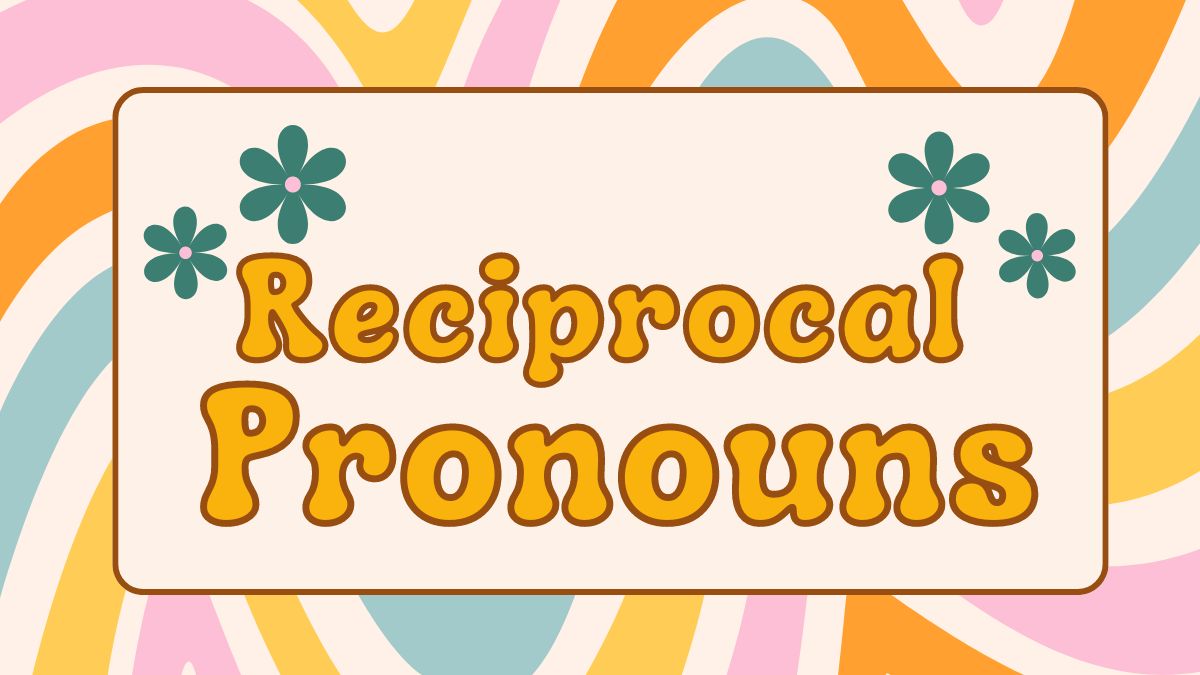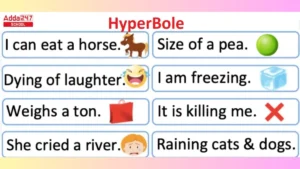Reciprocal pronouns are one of the special types of pronouns that are often used in the English language but discussed less often. A reciprocal pronoun is a pronoun that shows when two or more individuals are performing or have performed an action together, with each of them experiencing the effects of that action at the same time. Reciprocal pronouns are used whenever something is done or given back. This holds true whenever mutual action is portrayed.
Reciprocal Pronouns
Reciprocal pronouns are pronouns that show a mutual relationship between two subjects or objects. The English language grammar only has two reciprocal pronouns: ‘each other’ and ‘one another’. Read the entire article to gain a clearer grasp on how to use reciprocal pronouns in sentences by looking at its examples.
Reciprocal Pronouns Definition
Check the definition of these special type of pronouns according to leading dictionaries below.
According to the Oxford Learners’ Dictionary, ‘reciprocal’ means “involving two people or groups who agree to help each other or behave in the same way to each other.” The Merriam-Webster Dictionary defines a reciprocal pronoun as a pronoun, such as each other, that is used when the referents are expected to have the same relationship to each other.
Reciprocal Pronouns Examples
There are just two pronouns that are reciprocal. Both of them enable you to simplify sentences. They come in handy when you have to convey the same basic concept multiple times.
One another and Each other
Using reciprocal pronouns is straightforward. When you need to mention two individuals, you usually use the phrase “each other.” When talking about a group of people exceeding two, such as students in a lecture hall, the term “one another” is typically utilized.
Reciprocal pronouns in sentences serve to avoid repetition. In the following examples, reciprocal pronouns have been highlighted in italics for easier recognition.
- Maria and Juan gave each other gold rings on their wedding day.
- Maria and Juan kissed each other at the end of the ceremony.
- Terry and Jack were talking to each other in the hallway.
- We give each other gifts during the holidays.
- The students congratulated one another after giving practice speeches.
- The kids spent the afternoon kicking the ball to one another.
- The defendants blamed one another for the crime they were charged with.
Check the individual examples of both the reciprocal pronouns to understand how they express mutual relationship in a sentence.
One another
- The members of the board congratulated one another on a successful quarter.
- The elephants stood close together in order to protect one another.
- At the roast, the guests took turns making jokes about one another.
Each other
- The coaches spoke to each other about strategy.
- The chimpanzees shared food with each other.
- Romeo and Juliet love each other.
Reciprocal Pronouns Usage in Sentence
One key difference between reciprocal pronouns and other pronouns should be noted. Reciprocal pronouns differ from other pronouns in that they are generally only grammatically correct when serving as objects. This implies that we typically do not use a reciprocal pronoun as the subject of a sentence, clause, or phrase. Let us understand the correct use of these pronouns in a sentence by understanding the following example.
Correct: Barry and Mary are friends. They smiled at each other.
Incorrect: Barry and Mary are friends. Each other smiled at them.
Exercise caution towards one another. Indefinite pronouns each and other are capable of standing alone in a sentence. Furthermore, the term each has the flexibility to be utilized as either an adjective or an adverb, while the term other has the versatility to serve as an adjective, adverb, noun, or even a verb. One example is when the sentence describes Each bird in the tree looks different from each other one, using “each” as an adverb and “other” as an adjective.
It is important to note that the reciprocal pronoun can never be used as a subject. However, they can be used as possessive nouns, indirect objects and objects of the preposition. Check the usage of reciprocal pronouns in different forms below.
Reciprocal Pronouns as Possessive Nouns
Reciprocal pronouns can act as possessive nouns, indicating ownership of another noun. Check the examples below to understand this.
- Marcy and Elissa always sleep at each other’s houses.
- Don’t touch each other’s lunch boxes.
- We aren’t allowed to copy one another’s homework.
- Take a moment to listen to one another’s opinions.
Reciprocal Pronouns as Indirect Objects
When two nouns give each other the direct object, the reciprocal pronoun acts as an indirect object. Check the usage of reciprocal pronoun as indirect objects below.
- Mark and Robin sent each other sweaters for Christmas.
- We always tell one another our secrets.
- The whole school gave each other the flu this winter.
- My colleagues made one another homemade cookies.
Reciprocal Pronoun as Objects of Preposition
Occasionally, reciprocal pronouns are used as the object of a preposition to indicate the direction of the action. Check the following examples to understand this concept.
- We’re just creating more work for each other.
- Why must you always fight with one another?
- Please be kind to one another.
- The turkey and the pig glared at each other.
Difference Between Reciprocal Pronoun and Reflexive Pronouns
Understanding the contrast between reciprocal pronouns and reflexive pronouns is equally significant. Typically, these two kinds of pronouns are not interchangeable as they will alter the sentence’s meaning. Let us understand the difference between these two with the help of an example.
- Reflexive pronoun: Jenny and Kenny hugged themselves. (This sentence means that Jenny hugged herself and Kenny hugged himself.)
- Reciprocal pronoun: Jenny and Kenny hugged each other. (This sentence means Jenny hugged Kenny and Kenny hugged Jenny.)
Each other and one another can both be used as possessive words too.
- The countries agreed to respect one another’s trade routes.
- The students looked over each other’s homework.
Can we Use Each Other and One Another Interchangeably
Some style guides may indicate that each other and one another have distinct interpretations. It is commonly said that each other can only be used for two people/things while one another can only be used for more than two people/things.
This is not the case in typical usage. When writing or speaking informally, it is acceptable to use “each other” when referring to multiple people or things, and to use “one another” when referring to two people or things.
- David and Adrianna used flashcards to quiz one another.
- Every person in the room was suspicious of each other.
Reciprocal Pronouns Exercise
Test your knowledge about the reciprocal pronouns by solving the exercise given below.
- They were not able to see __________.
- Davis and Ally could not stand __________.
- The children were fighting with ____________.
- Fred and Jess gave ___________ gifts.
- The criminals blamed _______________.
Answers: Check the answer of the above exercise below.
- They were not able to see each other.
- Davis and Ally could not stand each other.
- The children were fighting with each other.
- Fred and Jess gave one another gifts.
- The criminals blamed one another.
| Related Articles | |
| Relative Pronouns | Subject Pronouns |
| Demonstrative Pronouns | Interrogative Pronouns |
| Object Pronouns | Personal Pronouns |









 Vocabulary Words with Meaning and Senten...
Vocabulary Words with Meaning and Senten...
 Past Perfect Tense: Definition, Formula,...
Past Perfect Tense: Definition, Formula,...
 Hyperbole- Explanation, Definition, Exam...
Hyperbole- Explanation, Definition, Exam...














